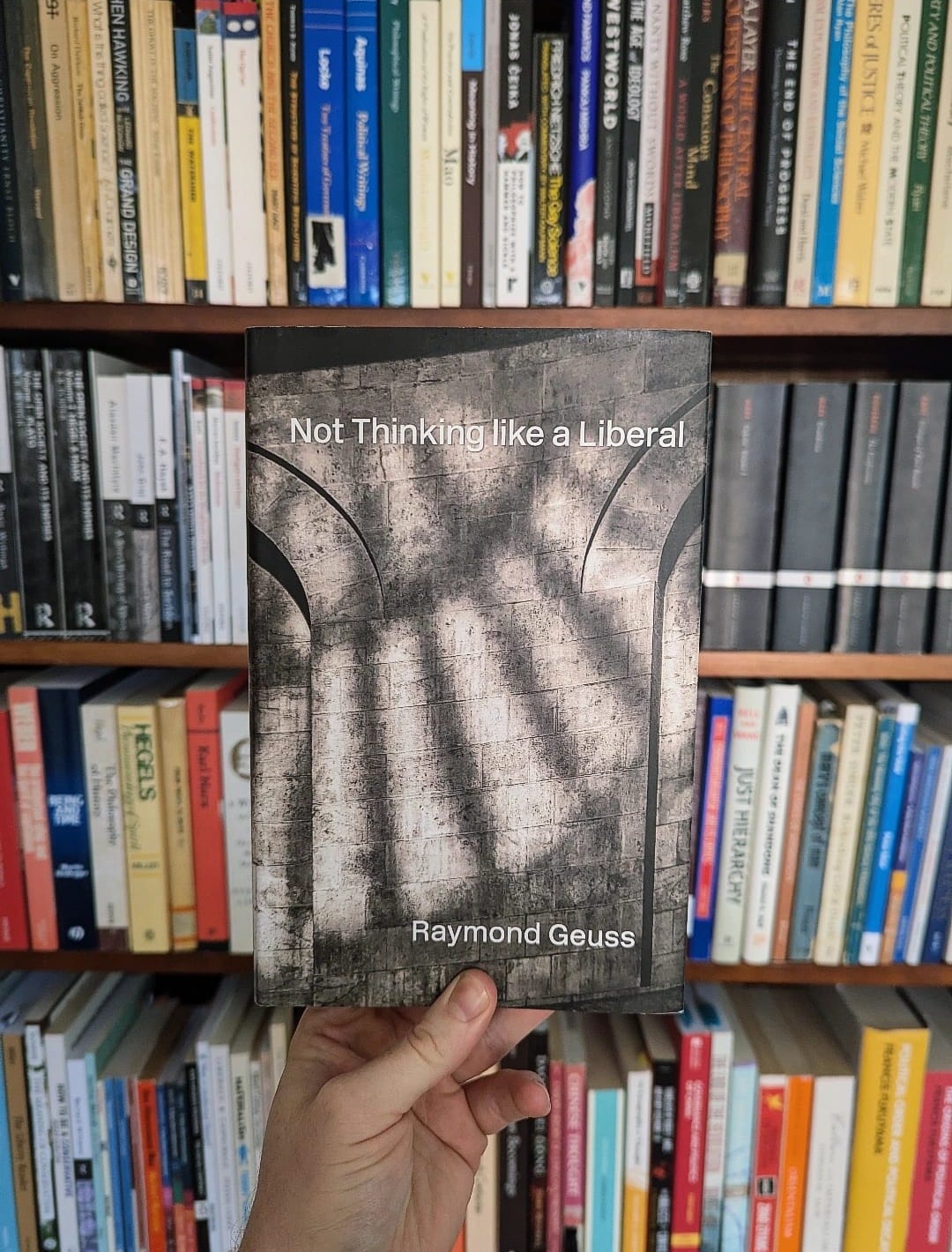Raymond Geuss’ ‘Not Thinking like a Liberal’ represents the swan song of my anti-liberalism. I selected this book for two reasons. First, Geuss is one of my favourite contemporary philosophers. His prose is limpid and his clarity of thought is infectious; just reading Geuss improves the quality of my thinking. Second, I have spent the last four years exploring criticisms of liberalism. It began with Patrick Deneen’s ‘Why Liberalism Failed’ before moving onto communitarian thinkers such as Charles Taylor, Michael Sandel and Daniel A. Bell. I was privileged enough to have Bell as a thesis supervisor while studying at Tsinghua University, where my anti-liberalism took on a Confucian-hue. The coronavirus pandemic also made me more receptive to critiques of capitalism, and during this time I deepened my knowledge of Marxism.
So, when a political theory reading group got started at the University of Melbourne by yours truly, Raymond Geuss’ latest work seemed like an ideal inaugural text: short, guaranteed to be well-written, and nicely reflects my own accumulated biases. Unfortunately, I was somewhat disappointed. Not Thinking like a Liberal is written in an autobiographical manner. Geuss’ aim is not to present liberal premises and reject them systematically like a standard philosophical argument - in fact, he is sceptical of this combative approach to knowledge in general - but rather to demonstrate that it is possible to think differently to liberals. Liberal beliefs like the sovereign individual are peculiar historical constructions. It is possible, Geuss suggests, to get along just fine without these constructions.
However, the autobiographical component is not what let me down. Instead, it was the fact that Geuss presents a straw man version of liberalism. To be fair, Geuss argues that because liberalism is a broad ideology with a long history, there are many different versions and interpretations of liberal philosophy.1 To avoid getting into the weeds, Geuss offers an “ideal type which focusses on some of the more central properties shared by many of the more influential specific formulations”.2 By taking this approach, Geuss succeeds only in describing a fictitious liberalism held by no one. Moreover, his conflation of liberal theory with everything that happens culturally, politically or economically within the borders of a so-called ‘liberal democracy’ is frankly embarrassing. I am reminded of the first-year university student or right-wing pundit, who, being of equal intelligence, dismiss the writings of Karl Marx because of the failures of the Soviet Union.
To give an example, Geuss asserts (without any evidence, mind you) that the Global Financial Crisis (GFC) was a “direct effect of the application of liberal doctrines to the banking system”.3 Not only does this subsume all versions of liberalism under neoliberalism, it suggests that prior to the deregulation of the financial sector in the 1970s and 80s, Western economies were guided by something other than liberalism. Of course, everyone knows that numerous liberal thinkers have recognised the need for economic regulation. Markets require constraints in order to function as intended; making this observation does not place you outside liberal company - Keynes was no socialist!
Unfortunately, the GFC example is indicative of a wider trend. Geuss repeatedly rejects ideologies because he finds something objectionable in their most extreme version. Perhaps he assumes that ideological extremists have successfully carried the underlying premises of an ideology to their logical endpoint, without making any errors of reasoning along the way. A particularly striking example of this is Geuss’ conflation of liberalism with libertarianism. Geuss writes that “libertarian anarchism [is] just a form of liberalism that got out of control”.4 I find this view to be completely unsupported.
John Rawls did not regard libertarianism as part of the liberal family tree. A liberal society, according to Rawls, is one that provides people with the material means to make use of their freedom. Invariably this requires some form of taxation and redistribution. Precisely because libertarianism rejects this, it does not deserve to be called liberal. Libertarianism is based on an extreme and crude version of individualism, one that is rejected by most liberal thinkers. Geuss, however, seems to imply that the libertarian position is the most pure version of liberalism, and therefore the entire liberal corpus ought to be rejected for implicitly resting on a fictitious conception of the self. I am not being uncharitable here. Geuss himself states that he rejects Rawls because of the libertarian anarchism of Robert Paul Wolff: “my experience in reading the writings of Robert Paul Wolff and listening to his lectures had inoculated me against Rawls”.5 It would seem that Geuss never did read his copy of A Theory of Justice.
Geuss concludes by saying that the tradition which runs from Locke through J.S. Mill and onto John Rawls is not a source of insight for anything. I fail to see the intellectual merit in rejecting such a simplified and over-generalised version of liberalism (or of anything, for that matter). When it comes to Rawls, the devil is in the detail, but so too is the delight. I simply can’t get on board with Geuss’ extreme attitude that there is nothing of value in an entire tradition. There is always some insight to be found. At the very least, one can come to understand how other people think. If the disposition to seek common ground makes me a liberal, then so be it.
Geuss, R 2022, Not Thinking like a Liberal, p. 27
Geuss, R 2022, p. 28
Geuss, R 2022, p. 166
Geuss, R 2022, p.121
Geuss, R 2022, p. 159




